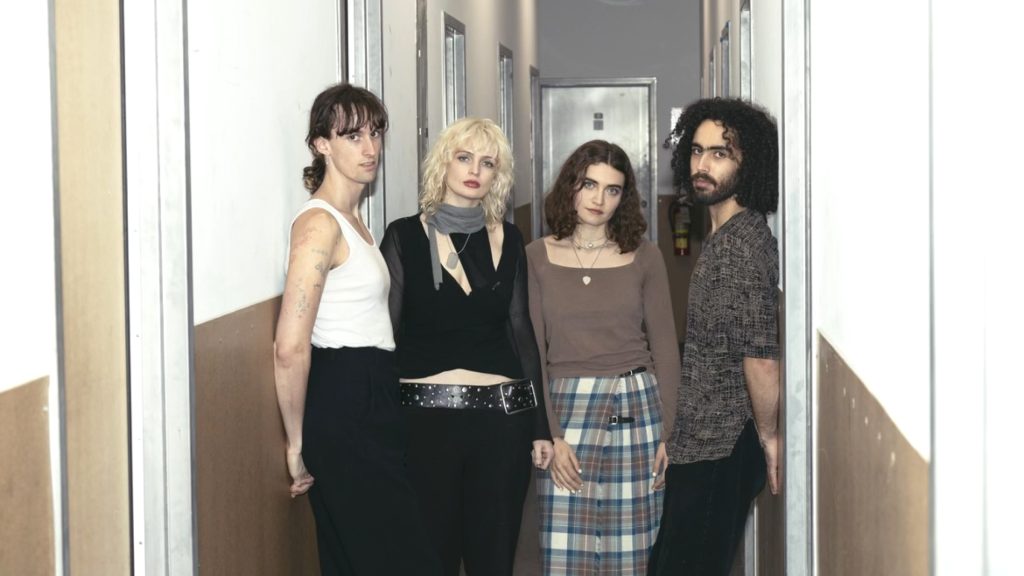God, I love a good concept album. For familiar examples: The Beatles’ playful alter egos in the psychedelic world of Sgt. Pepper’s Lonely Hearts Club Band or Janelle Monáe’s Metropolis-inspired futurist epic The ArchAndroid. There’s this novelistic or cinematic quality to their world-building and thematic interconnectedness, like listening to a story. Now, Brooklyn-based Birthday Girl has their own fresh take with their latest alt-rock album In This Unassuming Little House Only Good Things Can Happen. Each song stands strongly on its own as it defies genre, tone, and tempo, but we also get to follow and move closer to a perspective of their inner world as the album progresses.
“intro,” the first track—which signals the work’s scene or chapter-like composition through its title–is the most arresting on the album, a kittenish lullaby evoking innocence and sombreness. Beyond its catchiness, “intro” begins In This Unassuming Little House Only Good Things Can Happen delicately, with an underlying rage bubbling beneath the surface. Its eerie quality hinting at something darker around the corner is electric. There’s a haunting dichotomy between its melody and lyrics. Against the backdrop of a soft and trance-like tune performed by bassist Layla Passman, rhythm guitarist May Bush, lead guitarist/producer Avinoam Henig, drummer Akiva Henig, and keyboard/synth player Alex DeSimine, Eva Smittle gently sings lyrics such as: “Start my day crying / What if I am dying” and “Leave my house once a week like a lady or two.” It is reminiscent of the lullabies and nursery rhymes we hear in our childhood and take with us into adulthood. Grim and memorable, like “Ring Around the Rosie,” but for an older audience, of course.
The hummable melody embodies the cottagecore aesthetic; its innocence is evocative of fairies, meadows, and all that jazz—or even, perhaps, it’s the coquette aesthetic in sonic form, only unsettling, like doilies on a dusty piano. If you liked reading and/or watching The Virgin Suicides, this may be up your alley. “intro” sets listeners up to visualize the beauty of the house and its surroundings along with the story of girlhood, repression, melancholy, and indignation happening here.
There’s an immediate transition in energy when the next track begins. “Did you know I write you poems?” is alive with movement. Starting with lyrics like: “Yeah it eats me up, up / Up, up, up, up” its voice is ascending and orgasmic, reminiscent of a similar inflection and rebellion in the song “Cherry Bomb” by The Runaways. As the song goes on, with “Yeah yeah yeah” sung throughout, it ascends further—or rather higher. We then hear the song moving down, like gasping for breath after an intense experience, descending to its end.
But it’s not the end of the ride. We hear the rising and orgasmic qualities of the music again in the “I-I-I” sung in the following shoegaze track “Rupert!” There’s a fascinating play on gender in this one, with Smittle’s voice continuing its femininity but sardonically taking on what she may see as the perspective of a man: “If I weren’t a better man / I swear that I’d just let you use me.” “Rupert!” serves as the point at which the album’s punk rock becomes more apparent and is solidified in its tempo acceleration and voicing of sentiments, with a song title to match. Its use of an exclamation point can be interpreted at first glance as either playful or angry; though, when giving the song a listen, one can hear both descriptors as the same, since the lyrics “Rupert, Rupert, Rupert / Rupert, get back here Rupert” are sung with dynamic layers of both laughter and shouting.
The album’s blending of playful and rawness captures very human expressions of emotional multiplicities, further explored in “Anymore,” where we hear, “You want a mommy and a whore / I could be both of them but / I don’t want you anymore.” It’s remarkable how in just one song—let alone a few lyrics—the band brazenly captures the often polarized expectations placed on women. As one myself, listening to the impassioned track is a validating experience, affirming my frustrations with these misogynistic standards we face.
These representations of dualities don’t stop there. The aforementioned “I don’t want you anymore” lyric is sung over and over like a mantra one tries to speak into existence. The repetition leads me to question it as a form of subtext and its state as a truth, a lie, or both. Farce or not, “Anymore” stands out in its honest expression of complicated romantic feelings.
As In This Unassuming Little House Only Good Things Can Happen continues with its anger-fueled passion, it closes strongly with a roundup of established motifs, including the intricacies of womanhood and a tonal shift. Songs “Close My Eyes” and “Desire” return to the album’s initial surreal dreaminess, but like how there are some events that irrevocably change us, the closing songs carry with them the moody tones of those before them.
In addition to its patterns of lyrical and musical devices, the narrative aspect of the album manifests in its implications of a persona or character figure we follow along with—or rather a perspective that feels rooted in her truth and observed experiences. The character or perspective in question is a woman grappling with her place in the world. In “Close My Eyes” the singer croons, “Can I go back to just somebody’s daughter again?” and in “Desire” we hear this echoed in the lyrics “guilty daughter.” As our central character navigates her story through her relationships, ending the album on this note is not only fitting but is a well-earned conclusion.
The focal point of the album overall is its portrayal of how women are reduced to their roles in relation to men, as well as the deep confusion and contradictions that come with that. Is she meant to serve as a mother? Perceived and valued as a lover? Daughter? Does one negate the other?
The feminist themes and punk aspects of the album are reminiscent of the riot grrrl movement while incorporating an eclectic mix of pop and folksy melodies. In doing so, Birthday Girl brings us to better resonate with the rage of riot grrrl by weaving a tale full of moving arcs, pauses, and varied pacing. Even if musically indie rock isn’t your scene or quite to your taste, In This Unassuming Little House Only Good Things Can Happen makes the case for valuing the band’s garage girl rock. As Reese Witherspoon once said, “Women’s stories matter.”





